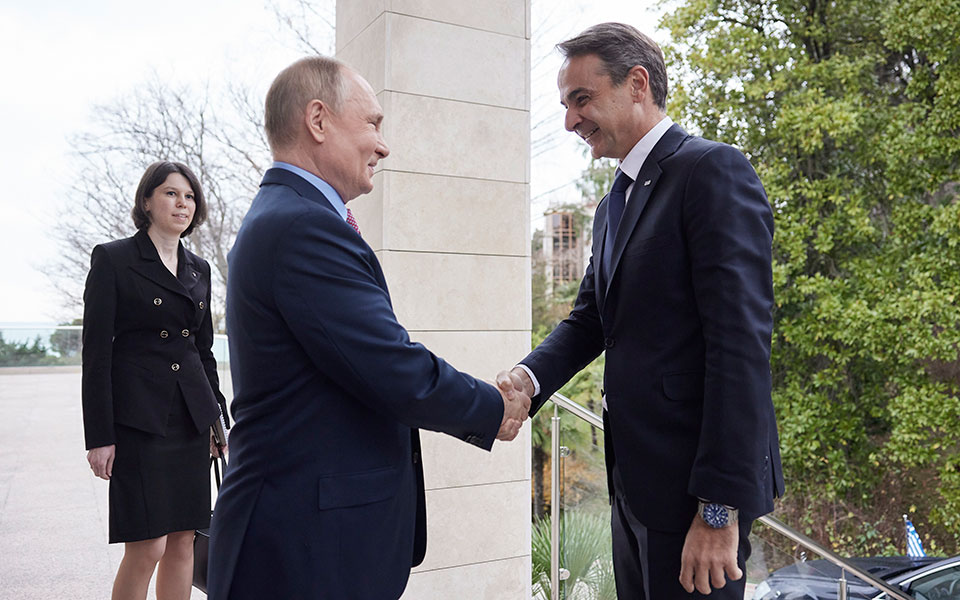Greek-Russian relations at their lowest point

Greek-Russian relations are at the worst possible point. Statements and actions from both sides are indicative of the bad vibes.
The Greek government’s directive to our embassies around the world not to invite Russian and Belarusian diplomats to their receptions on the occasion of the March 25 anniversary of the beginning of the 1821 War of Independence, prompted some circles to lash out, remembering Russia’s supportive role back then.
Of course, what they forgot to add was that, after the naval battle of Navarino and the independence treaties that established the Greek state, Russia, with a few exceptions, did not consistently support Greece. Even on the, very sensitive and important issue of Cyprus, it has been revealed that the Soviet Union had been informed in advance of the Turkish invasion in 1974, while Moscow’s apparently firm position in favor of the Greek-Cypriot positions disguised a desire to weaken Western influence in the region, find tax and banking havens and, of course, an unwillingness to seek a resolution to the division of Cyprus. Not that the position of our Western allies on the issue was satisfactory; quite the contrary. But, Russia, for decades, cultivated the expectation that it was the Greek Cypriots’ potential protector.
It is important to remind ourselves that, during the crisis that put Turkish occupying forces in conflict with the UN peace force in the village of Pyla in 2023, the UN Security Council, in August of that year, failed to agree on a resolution condemning Turkish actions because Russia refused to accept the UK’s draft resolution. In 2022, Russian Foreign Minister Sergei Lavrov had referred to the breakaway entity established in occupied northern Cyprus and recognized only by Turkey as the “Turkish Republic of Northern Cyprus” – a sign that Moscow’s position on Cyprus was no longer a principled position but one exclusively based on self-interest. Armenia has learned a painful lesson on that, having to turn to the West for support after its ostensible ally Russia abandoned it after 30 years in its war against Azerbaijan. Certainly, some US allies, such as the Kurds in Syria, have similar feelings of abandonment, and this is one reason for the waning of US influence.
2003-2008: The energy romance
During 2003-8, expectations were created about the strategic depth of Greek-Russian relationship. Athens, like Moscow, had opposed the US intervention in Iraq and Greece’s rotating presidency of the European Council in 2003 had been credited with the Four Common Spaces (Economic; Freedom, Security and Justice; External Security; Research, Education, Culture) deal between the EU and Russia signed in St Petersburg. Then, negotiations had begun on Greek participation in two energy projects, the Burgas-Alexandroupoli oil pipeline and the South Stream natural gas pipeline, none of which was implemented. The decade that followed was one of the realization of the limits of Greek-Russian relationships, on the one hand, and on Russian designs, not only in the post-Soviet spaces, but, more widely, in the Balkans, the Middle East and Africa.
2010-2015: The drachma gamble
Greek-Russian relatations have been seriously strained since 2018. But, in 2010, Greece, overburdened by debt and facing bankruptcy, had asked Russia to buy its sovereign bonds before it would have to turn to the EU and the International Monetary Fund for support. Vladimir Putin, then in his interlude as prime minister, had firmly rejected the request.
And, when the SYRIZA-led government tried to use Moscow as a counterweight in its fraught negotiations with Greece’s creditors, Putin had revealed Greece’s approach to then-French President Francois Hollande. In a subsequent memoir Hollande said Putin called and told him that “Greece has asked us to print drachmas in Russia because they no longer had the printing machinery to do that.” It was obvious that Russia’s then-pragmatic leadership took it for granted that Greece would not shift on its strategic alliances and that Russia should not risk its relationship with Germany and France by being accused of undermining the EU.
2018: Storm at Prespes
Russia had opposed the 2018 Prespes Agreement that ended the decades-long conflict between Greece and Northern Macedonia. In the wake of the agreement, there had been mutual expulsions of Greek and Russian diplomats deemed personae non gratae. Greece’s decision to make the expulsions public was made by Prime Minister Alexis Tsipras, who had been extremely irritated by Russia’s encouragement of aggressive opposition to the agreement, mainly in northern Greece, but also places such as Nafplio and Corfu. Moscow’s infiltration of certain religious and local government bodies had alarmed the Greek government, which had also become aware of intense Russian spying activity.
Greek-Russian relations, despite being attenuated by Russia’s annexation of Crimea in March 2014 and the EU sanctions that followed, were at a tolerable level, while not always functional, until the invasion of Ukraine in February 2022. There were exchanges and visits at high and middle diplomatic levels, energy cooperation was continuous and, indeed, Greece’s Public Gas Corporation (DEPA) and Russia’s Gazprom had signed a revised contract with more favorable terms for the Greeks. There were also continued cultural contacts and, when Greece celebrated, in 2021, the bicentennial of the start of the War of Independence, it was decided to declare the year a common Greek-Russian history year, with events taking place in both countries. Gazprom tried to get involved in the privatization of DEPA but retreated at the last moment after the EU raised objections; apparently it had received assurances from Athens that Brussels would not object.
2021-present: The partnership with Erdogan, and Ukraine
Greece had, meanwhile, strengthened its relationship with the US, while Russia had embarked on a strategic partnership with Turkey. Russia’s sale of the highly effective S-400 missile system to Turkey alarmed Greeks, as did the partnership to build nuclear power stations in Turkey and Moscow’s careful, but clear to the trained eye, shift from established diplomatic positions. Even Foreign Minister Sergey Lavrov’s positive statement, during his 2021 Athens visit, in favor of Greece’s right to expand its territorial waters to 12 nautical miles, had been cloaked in ambiguity by the statement that “it is a different thing when the territorial waters defined by a state conflict with the interests of a neighboring state. If it is determined that these interests are legitimate according to the Law of the Sea Convention, it is necessary to seek a solution through dialogue and a balance of interests.” Lavrov had, in a way, adopted Turkey’s position, encouraging both sides to come to an understanding about a unilateral Greek right. To be sure, this is a view also expressed by our Western partners.
But what put Greek-Russian relations on a negative spiral were the accommodations provided to the US in Alexandroupoli and Russia’s invasion of Ukraine. Moscow considers the transport of army supplies, which it considers war supplies, from Alexandroupoli to Romania and hence to Ukraine as a quasi-hostile action. It is also concerned by the import of liquefied natural gas (LNG), mainly, but not exclusively, from the United States as a further turning away, even on a small scale, of the European and the Balkan markets from Russian gas. The use of Alexandroupoli as a US military base and the most widespread ever American military presence in Greece has consolidated Russia’s conviction that Athens is Washington’s passive instrument.
The similarities with Cyprus
Athens, for its part, finds enough similarities between Russian revisionism on Ukraine and Turkey’s revisionism on Greece, with both using similar scare tactics and propaganda methods, invoking the “protection” of kindred populations. That is why Greece chose, from the very start, to clearly stand by Ukraine, also given the clear violation of its sovereignty against all principles of international law. Even the demilitarization of the Greek islands that Turkey pursues, in order to render them defenseless, is similar to the Russian position for Ukraine’s disarmament, because an armed Ukraine is supposedly a threat to Russia’s security. This confluence of positions between Moscow and Ankara forced Athens to clearly and unconditionally support Kyiv. The bombardment of Mariupol and surrounding villages in 2022 led to the death of many ethnic Greeks. Greece’s inclusion in a list of “unfriendly countries” in July 2022 was revealing of the new state of Greek-Russian relations.
The Greek side believes Russia has abandoned international legality by forcing the secession of Abkhazia and South Ossetia from Georgia, annexing Crimea and then almost a fifth of Ukraine’s territory and encourages revisionists around the world, one of which happens to be our neighbor. On the other hand, Moscow, looking for fissures and footholds in the West, finds that it cannot use Greece as one of them, as we have joined the hard core of the Western Alliance. The numerous expulsions of Russian diplomats and our alignment with the positions of Poland and the Baltic states are proof, although these countries have different historical memories. The signing of a security agreement with Kyiv, something which Ukrainian President Volodymyr Zelenskyy has hinted at, would be a further decisive step in our already shaken relationship with Moscow. Such agreements have already been signed with Canada, Denmark, France, Germany, Italy and the UK. As a Russian party told me, the period where Greece enjoyed a relative immunity is over.





